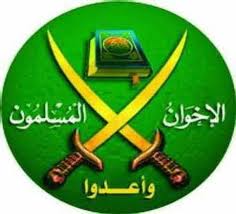Latest NEWS
- Aswat Masriya, the last word
- Roundup of Egypt's press headlines on March 15, 2017
- Roundup of Egypt's press headlines on March 14, 2017
- Former Egyptian President Hosni Mubarak to be released: lawyer
- Roundup of Egypt's press headlines on March 13, 2017
- Egypt's capital set to grow by half a million in 2017
- Egypt's wheat reserves to double with start of harvest -supply min
- Roundup of Egypt's press headlines on March 12, 2017
Court ruling hangs over Egypt's Muslim Brotherhood

Muslim Brotherhood logo
By Tom Perry
CAIRO, March 21 (Reuters) - An Egyptian judge rules next week on whether President Mohamed Mursi's Muslim Brotherhood is illegal, in a case that has put the group on the defensive and may stoke political tension.
Seeking to shield itself ahead of the ruling due on Tuesday, the Brotherhood announced this week it had gained new legal status by registering as a non-governmental organisation, reversing a previous decision not to do so under existing laws.
Brought by anti-Brotherhood lawyers, the court case points to the deep antipathy some harbour towards a group that was formally dissolved in 1954 and forced to operate underground until President Hosni Mubarak was ousted two years ago.
The impact of any ruling against the Brotherhood is likely to be more political than practical: analysts find it inconceivable that the state will take any measures against a group that is now at the heart of power.
But such a decision could stir more rancour against the Islamists as they face increasingly violent protests. Hardcore activists have called for more demonstrations outside the Brotherhood's headquarters on Friday.
A ruling against the Brotherhood would "add fuel to the acrimony between the Brotherhood supporters and detractors", said Elijah Zarwan, a Cairo-based political analyst.
It might also trigger more lawsuits against the Brotherhood. The courts have had a major impact on the political transition to date, cancelling elections this year and dissolving parliament last year.
Pointing to the chances of a ruling against the Brotherhood next week, a report by a panel of judges published on Wednesday upheld the view that the group had no legal status.
BROTHERHOOD APPROVED AS NGO
"The legal argument is that this group was dissolved in 1954," said Shehata Mohamed Shehata, one of the lawyers behind the case, adding that he wanted the group's name banned, its offices closed and its finances frozen.
Established in 1928, the Brotherhood has emerged as Egypt's best organised political force despite decades of oppression at the hands of military-backed autocrats. Following the uprising against Mubarak, it established a political party that was headed by Mursi until he was elected president.
The Brotherhood argues that it has won both popular and legal legitimacy. But it has still taken extra steps to shield itself. The decision to register as an NGO under existing legislation marked a reversal of an earlier decision not to do so until a new civil society law was passed.
The Ministry of Social Affairs received the Brotherhood's application for NGO status on Tuesday and it had been accepted, Nagwa Khalil, the minister, told the state-run MENA news agency.
"We will follow the activities and the budget of the Brotherhood society," she said, raising the possibility that group's finances will be open to scrutiny for the first time.
The Brotherhood says the NGO status makes no difference to its legitimacy. Abdel Moneim Abdel Maqsoud, its lawyer, argued that the group had been legal since it was founded.
In an interview with Al Jazeera's Egypt news channel, he described challenges to the Brotherhood's legality as part of efforts to "inflame violence against the group".
The Brotherhood had said it did not want to register under a law that dated to the Mubarak era. "What made us do that are the attempted ambushes targeting the group," he said.
The government's swift approval of the Brotherhood NGO has raised question marks for some. "This will cast doubts over the neutrality of the state institutions," said Khalil al-Anani, an expert on Islamist movements at Durham University.
The Brotherhood was "adopting a defensive strategy to ease the tension", he added. (Editing by Alistair Lyon)










